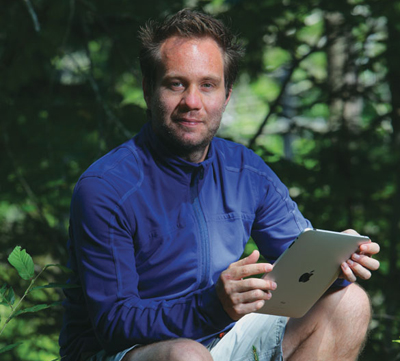 |
| English professor Dean Irvine is marshalling forces to change perceptions of Canadian literature by leading an international, multi-million-dollar research project funded by the Social Sciences and Humanities Research Council (SSHRC). |
For bookworms everywhere, it’s a dream come true: being able to read an entire library.
‚ÄúIt doesn‚Äôt matter how good you are, right now no one person can do that in a lifetime,‚ÄĚ says¬† Dean Irvine, associate professor of English¬† at ĻŻĹī ”∆Ķ.
Now, a revolutionary approach to ‚Äėreading‚Äô texts can put the knowledge of an entire library at the fingertips of humanist scholars. Enter the frontier of the digital humanities, an emerging discipline that is changing almost as quickly as it is expanding.
‚ÄúA few years ago we could not even have imagined asking ‚Äď let alone answering ?‚Äď the kinds of questions that are being posed today,‚ÄĚ he says. ‚ÄúWe can extract, or?‚Äėmine,‚Äô information from a million different texts, whether that means by searching keywords, tracing links, or visually representing content in terms of timelines, maps, charts or graphs.‚ÄĚ
To accomplish this, texts first must be ‚Äėmarked up‚Äô to encode references to topics like history, geography, race, gender and so forth.
‚ÄúIt enriches the text, creating semantics and a more meaningful web,‚ÄĚ he says. ‚ÄúThe Internet has a surface, but we can add depth ‚Äď if we have the tools to extract information at deeper levels of meaning.‚ÄĚ
Novel research technique
While different approaches have been applied in various countries, until now there has not been a coordinated methodology.¬† ‚ÄúWhat hasn‚Äôt happened is a large scale, integrated approach to text analysis, data mining and visual representation.‚ÄĚ
Dr. Irvine is marshalling forces to change perceptions of Canadian literature by leading an international, multi-million-dollar research project funded by the Social Sciences and Humanities Research Council (SSHRC). The $3.8 million SSHRC Strategic Knowledge Cluster / Strategic Network Grant continues until 2014.
While the original intent of his research is to illuminate a previous generation of Canadian authors, a novel research technique will make their radical writing accessible to the next generation of humanities scholars. During this exploration of Canadian fiction from the 1920s to the 1940s, he’s reimagining the entire approach to literary research.
Dr. Irvine has entered into a partnership with the Canadian Writing and Research Collaboratory. Principal investigator Susan Brown, at the University of Guelph, holds a Canada Foundation for Innovation (CFI) Leading Edge Fund grant of $2.9 million. This large-scale initiative aims to create a collaborative, image-based editing tool: ‚ÄúNone of the existing tools can talk to each other ‚Äď that‚Äôs the leap and bound.‚ÄĚ
Through this partnership, ĻŻĹī ”∆Ķ now has a major stake in a developmental milestone. In little more than a year, Editing Modernism in Canada has grown from 32 associated scholars to more than 80 ‚Äď and is still growing. By next year, Dr. Irvine expects that a related course will be offered on campus.
This unprecedented collaboration between government, university and industry partners focuses on creating tools for the next generation humanist. Creating such editing tools is the purview of a chimera known as a digital humanist. 
'The book is not dead, but...'
Producing such digital humanists requires a different approach to graduate education, including the structure of the traditional relationship between supervisor and student. The intention is to empower the graduate student as an authority by borrowing elements from both the lab- and studio-based learning environments.
Over the past summer, 20 of his affiliated graduate students and new scholars trained at the Digital Humanities Summer Institute at the University of Victoria.
‚ÄúIt‚Äôs learn by doing, no question. They need research skills, coding skills and the ability to adapt tools for their own purposes.‚Ä̬†
For example, a graduate student will learn to take a digital image ‚Äď of a painting or a poem ‚Äď and select and annotate a component. It‚Äôs somewhat like a footnote, except ?the notation appears when a cursor slides over a zone on the image.¬†¬† It becomes possible to read, for instance, a related original excerpt from an eighteenth century newspaper as a result of the image mark up tool.
‚ÄúThe book is not dead, but now there can be ‚Äėborn digital‚Äô texts too. In three years time, the whole concept of reading online in terms of portability and resolution could be an entirely different story.‚ÄĚ
Despite the as yet unimagined possibilities, Dr. Irvine describes himself as a realistic idealist.
‚ÄúThis is the single most important development in the humanities that I‚Äôm likely to see in my entire career,‚ÄĚ he says. ‚ÄúWe‚Äôre doing scholarship unimaginable to a humanist even a decade ago.‚ÄĚ
